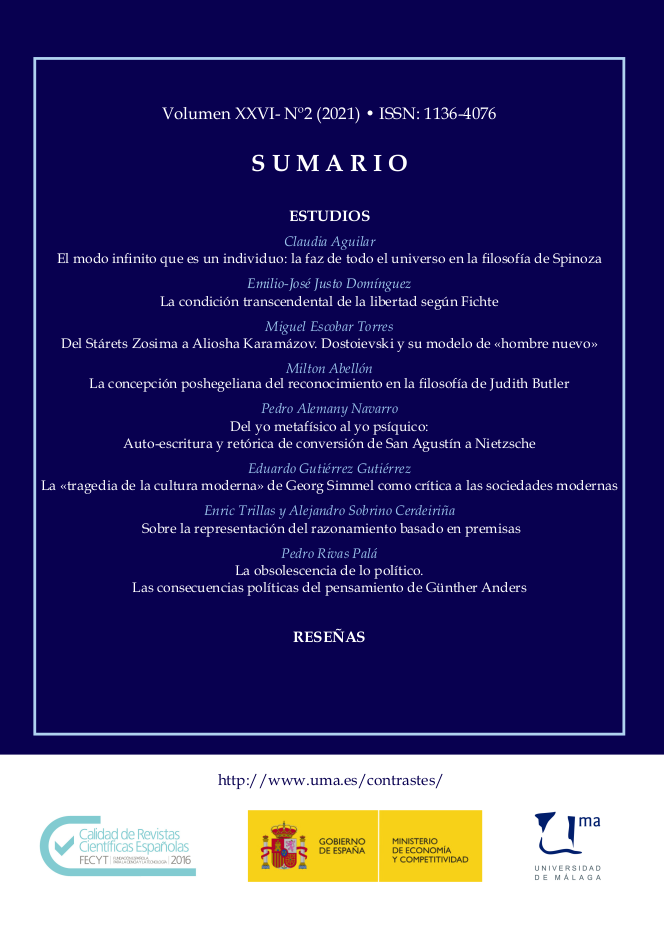On the representation of premise-based reasoning
DOI:
https://doi.org/10.24310/Contrastescontrastes.v26i2.10169Keywords:
Conjecture, hypothesis, speculation, vague predicates, fuzzy sets.Abstract
This paper deals with a new way of approaching the premise-based reasoning, suggesting that reasoning is conjecturing or refuting and that conjecturing is to figure out what is hidden in the premises, explaining them or speculating from them. Next, the role of fuzzy sets to represent the imprecise meaning characteristic of ordinary reasoning is addressed, showing the membership function as a kind of approximation to the extent to which an object satisfies the property denoted by the vague predicate. Finally, some limitations of the formalisms of the common-sense reasoning are addressed.
Downloads
Metrics
Publication Facts
Reviewer profiles N/A
Author statements
Indexed in
-
—
- Academic society
- N/A
- Publisher
- Universidad de Málaga
References
AARTS, B., D. DENISON, E. KEIZER, and G. POPOVA (eds.) 2004: Fuzzy Grammar. A Reader. Oxford University Press.
ARISTOTELES -345: Primeros Analíticos, Biblioteca Filosófica, Medina y Navarro, Volumen 7, Madrid, 1875. Traducción de Patricio de Azcárate.
BIRKHOOF, G. & J.VON NEUMANN 1936: ‘The Logic of Quantum Mechanics’. The Annals of Mathematics, 2nd ser., Vol. 37, No. 4., pp. 823-843.
BOOLE, G., 1847: The Mathematical Analysis of Logic. Being an essay towards a calculus of deductive reasoning. MacMillan, Barclay & MacMillan, London. Consultado en Googlebooks, 12/1/2020.
BOOLE, G., 1854: An Investigation of the Laws of Thought. The mathematical theories of logic and probabilities. Walton and Maberly. Cambridge. Consultado en Googlebooks,12/1/2020.
CASTRO, J. L., 1995: ‘Fuzzy logic controllers are universal approximators’, IEEE Trans on Systems, Man, and Cybernetics, Vol. 25, Nº. 4, 629-635. https://doi.org/10.1109/21.370193
EUCLIDES, -300: Elementos. Universidad de Santiago de Compostela-Fundación BBVA, 2013.
KNEALE, W. & KNEALE, M., 1962: The development of Logic. Oxford at the Clarendon Press.
LEIBNIZ. G. 1689: ‘Escritos lógico-matemáticos; Escritos sobre máquinas y ciencias físico-naturales’. En, Obra completa, Javier Echeverría (ed.), Biblioteca de Grandes Pensadores. Editorial Gredos, 2011.
MEDAWAR, P., 1987: The Limits of Science, Oxford University Press, Oxford. Ver. cast. en Fondo de Cultura Económica, 1988.
POPPER, K.R. 1963: Conjectures and Refutations, Routledge & Kegan Paul, London.
RESCHER, N. 1969: Many-Valued Logic, McGraw-Hill, New York.
SCHRÖDER, E., 1890–1910: Algebra der Logik, Vols. I–III; reprint Chelsea 1966.
SINGH, S. 2018: “The Whole Story".Edited version of ~2,000-word essay published in Prometheus magazine. https://simonsingh.net/books/fermats-last-theorem/the-whole-story/ Consulta: 12/1/2018.
TARSKI, A. 1936: Introducción a la lógica y a las ciencias deductivas, Espasa-Calpe, 1985. V. orig. en Dover, 1936.
TRILLAS, E., GARCIA-HONRADO, I., 2013: ¿Hacia un replanteamiento del cálculo proposicional clásico? Ágora, 12/1: 7-25.
TRILLAS, E., 2015: Razonamiento, significado, incertidumbre y borrosidad. Publicaciones de la Universidad Pública de Navarra.
TRILLAS, E., 2017: On the Logos: A Naive View of Ordinary Reasoning and Fuzzy Logic. Springer, 2017.
TRILLAS, E., 2018: El desafío de la creatividad. Eds. Universidade de Santiago de Compostela.
VON NEUMANN, J 1951: ‘The General and Logical Theory of Automata’, in Lloyd A. J. (ed.), Cerebral Mechanisms in Behavior. The Hixon Symposium. Wiley, Nueva York.
WHEWELL, W., 1847: The Philosophy of the Inductive Sciences, Founded Upon Their History, 2ª edición (dos volúmenes). London: John W. Parker.
WIENER, N., 1962: Cybernetics, or control and communication in the animal and the machine, MIT Press, Cambridge, Massachusetts.
ZADEH, L. A., 1965: ‘Fuzzy sets’, Information and control, vol. 8, pp. 338–353.
ZADEH, L. A., 1973: ‘Outline of a New Approach to the Analysis of Complex Systems and Decision Processes’, IEEE Trans. on Systems, Man, and Cybernetics, Vol. SMC-3, nº 1, 28-44.
ZADEH, L. A., 1984: ‘Fuzzy probabilities’, Information Processing & Management, 20, No 3. 363-372.
Downloads
Published
How to Cite
Issue
Section
License
This journal provides immediate free access to its content under the principle of making research freely available to the public. All content published in Contrastes. Revista Internacional de Filosofía, are subject to the Creative Commons Attribution-NonCommercial-ShareAlike 4.0 license whose full text can be found at <http://creativecommons.org/licenses/by-nc-sa/4.0>
It is the responsibility of the authors to obtain the necessary permissions of the images that are subject to copyright.
Authors whose contributions are accepted for publication in this journal will retain the non-exclusive right to use their contributions for academic, research and educational purposes, including self-archiving or repository in open access repositories of any kind.
The electronic edition of this magazine is edited by the Editorial Service of the University of Malaga (Uma Editorial), being necessary to cite the origin in any partial or total reproduction.










5.png)
